Reflective Journal: Business, Society, and Planet - Sustainability
VerifiedAdded on 2023/01/18
|6
|1418
|79
Journal and Reflective Writing
AI Summary
This reflective journal examines the critical topic of sustainability in the modern business world, prompted by the rapid increase in global population and industrial activities. The author explores the impact of these factors on ecosystems, fossil fuel reserves, greenhouse gas emissions, and climate change. The journal delves into the concept of sustainability, the United Nations' Sustainable Development Goals (SDGs), and the Triple Bottom Line (TBL) system, which evaluates business performance based on social, environmental, and economic sustainability. The author discusses the importance of CSR policies, challenges in their implementation, and the six types of capital used by corporations. The author also reflects on the video 'Story of Stuff,' analyzing its critique of consumerism and its relevance to sustainability issues. The journal concludes by emphasizing the need for businesses to embrace strategic sustainability and highlights the growing significance of sustainability for future generations and the business world.
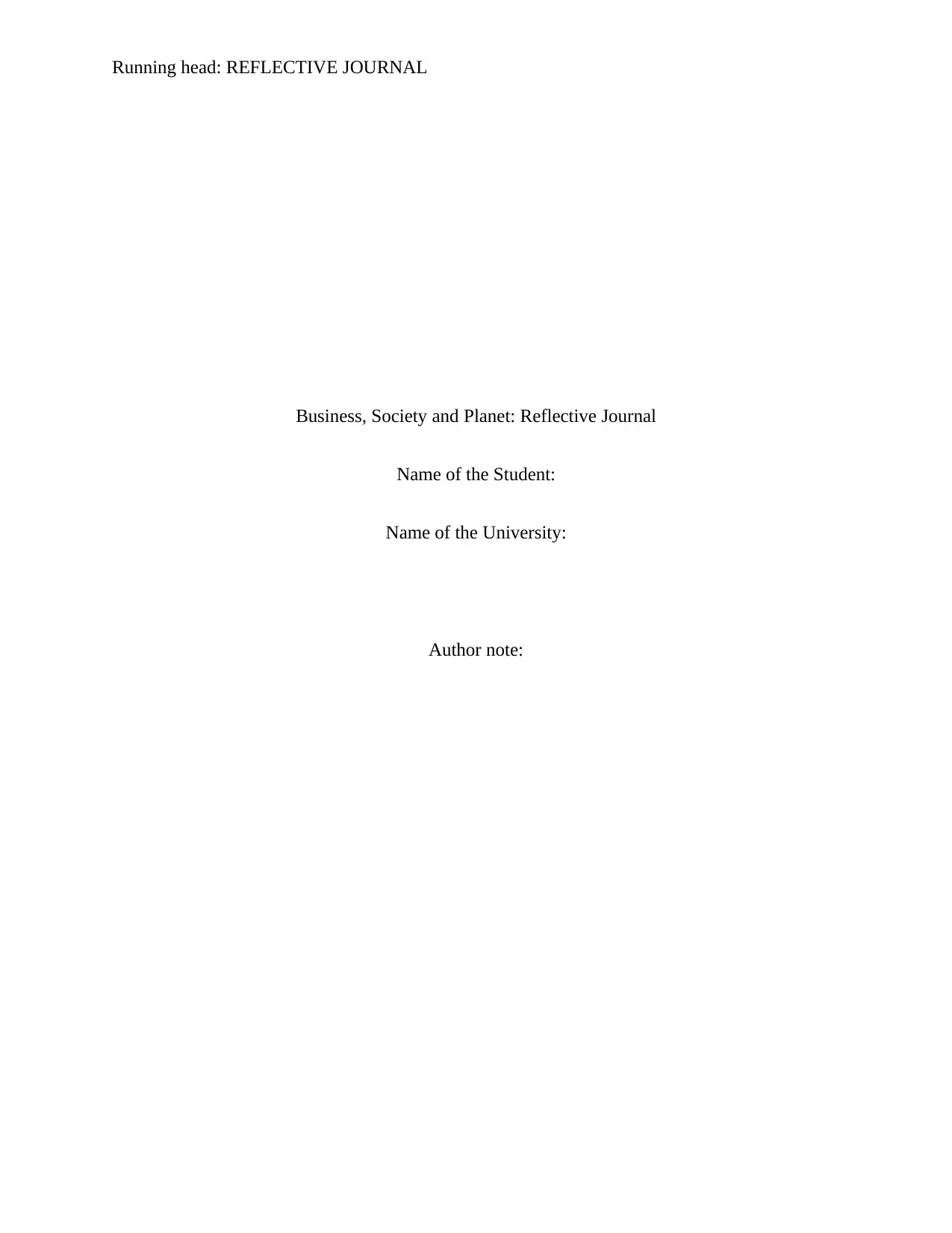
Running head: REFLECTIVE JOURNAL
Business, Society and Planet: Reflective Journal
Name of the Student:
Name of the University:
Author note:
Business, Society and Planet: Reflective Journal
Name of the Student:
Name of the University:
Author note:
Paraphrase This Document
Need a fresh take? Get an instant paraphrase of this document with our AI Paraphraser
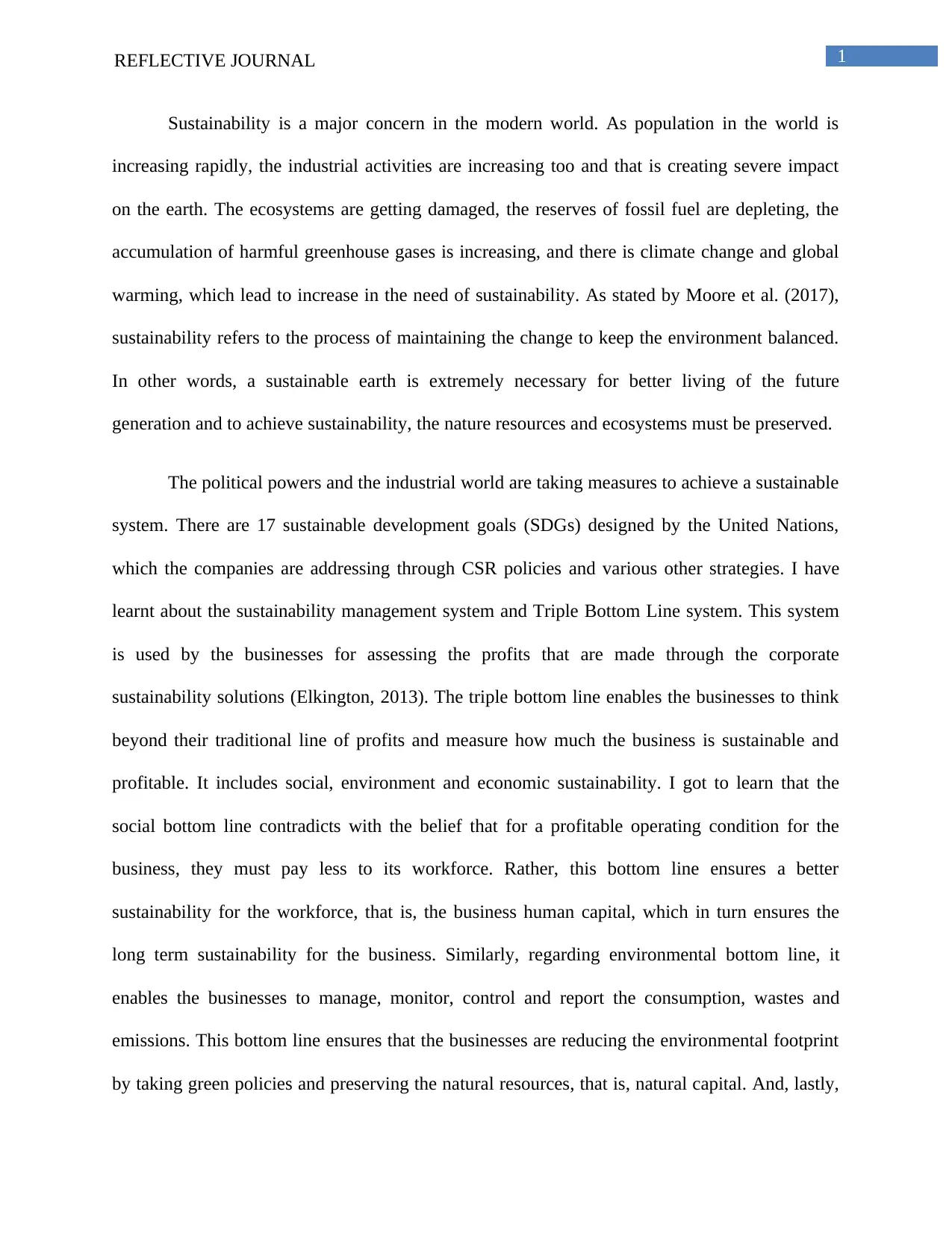
1REFLECTIVE JOURNAL
Sustainability is a major concern in the modern world. As population in the world is
increasing rapidly, the industrial activities are increasing too and that is creating severe impact
on the earth. The ecosystems are getting damaged, the reserves of fossil fuel are depleting, the
accumulation of harmful greenhouse gases is increasing, and there is climate change and global
warming, which lead to increase in the need of sustainability. As stated by Moore et al. (2017),
sustainability refers to the process of maintaining the change to keep the environment balanced.
In other words, a sustainable earth is extremely necessary for better living of the future
generation and to achieve sustainability, the nature resources and ecosystems must be preserved.
The political powers and the industrial world are taking measures to achieve a sustainable
system. There are 17 sustainable development goals (SDGs) designed by the United Nations,
which the companies are addressing through CSR policies and various other strategies. I have
learnt about the sustainability management system and Triple Bottom Line system. This system
is used by the businesses for assessing the profits that are made through the corporate
sustainability solutions (Elkington, 2013). The triple bottom line enables the businesses to think
beyond their traditional line of profits and measure how much the business is sustainable and
profitable. It includes social, environment and economic sustainability. I got to learn that the
social bottom line contradicts with the belief that for a profitable operating condition for the
business, they must pay less to its workforce. Rather, this bottom line ensures a better
sustainability for the workforce, that is, the business human capital, which in turn ensures the
long term sustainability for the business. Similarly, regarding environmental bottom line, it
enables the businesses to manage, monitor, control and report the consumption, wastes and
emissions. This bottom line ensures that the businesses are reducing the environmental footprint
by taking green policies and preserving the natural resources, that is, natural capital. And, lastly,
Sustainability is a major concern in the modern world. As population in the world is
increasing rapidly, the industrial activities are increasing too and that is creating severe impact
on the earth. The ecosystems are getting damaged, the reserves of fossil fuel are depleting, the
accumulation of harmful greenhouse gases is increasing, and there is climate change and global
warming, which lead to increase in the need of sustainability. As stated by Moore et al. (2017),
sustainability refers to the process of maintaining the change to keep the environment balanced.
In other words, a sustainable earth is extremely necessary for better living of the future
generation and to achieve sustainability, the nature resources and ecosystems must be preserved.
The political powers and the industrial world are taking measures to achieve a sustainable
system. There are 17 sustainable development goals (SDGs) designed by the United Nations,
which the companies are addressing through CSR policies and various other strategies. I have
learnt about the sustainability management system and Triple Bottom Line system. This system
is used by the businesses for assessing the profits that are made through the corporate
sustainability solutions (Elkington, 2013). The triple bottom line enables the businesses to think
beyond their traditional line of profits and measure how much the business is sustainable and
profitable. It includes social, environment and economic sustainability. I got to learn that the
social bottom line contradicts with the belief that for a profitable operating condition for the
business, they must pay less to its workforce. Rather, this bottom line ensures a better
sustainability for the workforce, that is, the business human capital, which in turn ensures the
long term sustainability for the business. Similarly, regarding environmental bottom line, it
enables the businesses to manage, monitor, control and report the consumption, wastes and
emissions. This bottom line ensures that the businesses are reducing the environmental footprint
by taking green policies and preserving the natural resources, that is, natural capital. And, lastly,
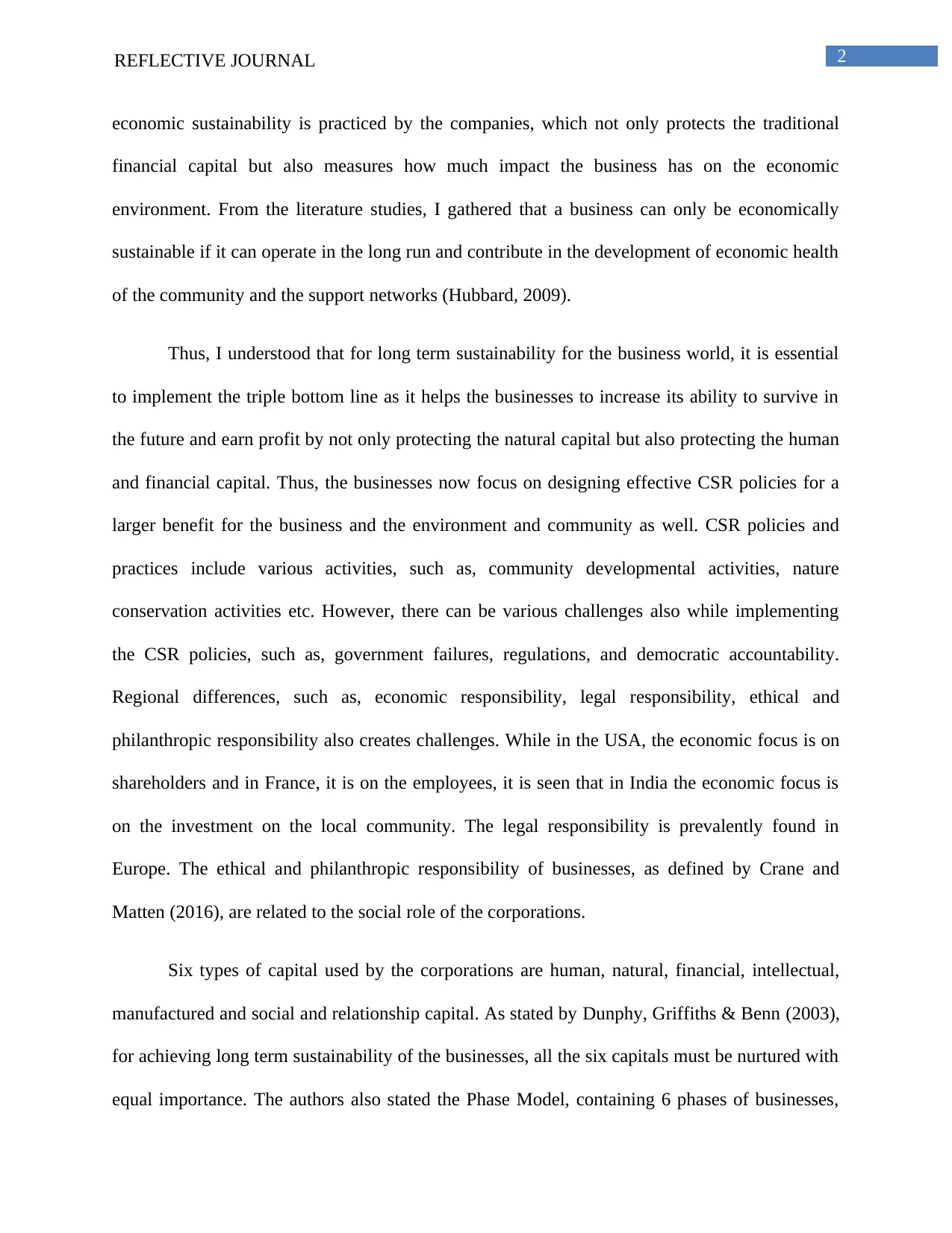
2REFLECTIVE JOURNAL
economic sustainability is practiced by the companies, which not only protects the traditional
financial capital but also measures how much impact the business has on the economic
environment. From the literature studies, I gathered that a business can only be economically
sustainable if it can operate in the long run and contribute in the development of economic health
of the community and the support networks (Hubbard, 2009).
Thus, I understood that for long term sustainability for the business world, it is essential
to implement the triple bottom line as it helps the businesses to increase its ability to survive in
the future and earn profit by not only protecting the natural capital but also protecting the human
and financial capital. Thus, the businesses now focus on designing effective CSR policies for a
larger benefit for the business and the environment and community as well. CSR policies and
practices include various activities, such as, community developmental activities, nature
conservation activities etc. However, there can be various challenges also while implementing
the CSR policies, such as, government failures, regulations, and democratic accountability.
Regional differences, such as, economic responsibility, legal responsibility, ethical and
philanthropic responsibility also creates challenges. While in the USA, the economic focus is on
shareholders and in France, it is on the employees, it is seen that in India the economic focus is
on the investment on the local community. The legal responsibility is prevalently found in
Europe. The ethical and philanthropic responsibility of businesses, as defined by Crane and
Matten (2016), are related to the social role of the corporations.
Six types of capital used by the corporations are human, natural, financial, intellectual,
manufactured and social and relationship capital. As stated by Dunphy, Griffiths & Benn (2003),
for achieving long term sustainability of the businesses, all the six capitals must be nurtured with
equal importance. The authors also stated the Phase Model, containing 6 phases of businesses,
economic sustainability is practiced by the companies, which not only protects the traditional
financial capital but also measures how much impact the business has on the economic
environment. From the literature studies, I gathered that a business can only be economically
sustainable if it can operate in the long run and contribute in the development of economic health
of the community and the support networks (Hubbard, 2009).
Thus, I understood that for long term sustainability for the business world, it is essential
to implement the triple bottom line as it helps the businesses to increase its ability to survive in
the future and earn profit by not only protecting the natural capital but also protecting the human
and financial capital. Thus, the businesses now focus on designing effective CSR policies for a
larger benefit for the business and the environment and community as well. CSR policies and
practices include various activities, such as, community developmental activities, nature
conservation activities etc. However, there can be various challenges also while implementing
the CSR policies, such as, government failures, regulations, and democratic accountability.
Regional differences, such as, economic responsibility, legal responsibility, ethical and
philanthropic responsibility also creates challenges. While in the USA, the economic focus is on
shareholders and in France, it is on the employees, it is seen that in India the economic focus is
on the investment on the local community. The legal responsibility is prevalently found in
Europe. The ethical and philanthropic responsibility of businesses, as defined by Crane and
Matten (2016), are related to the social role of the corporations.
Six types of capital used by the corporations are human, natural, financial, intellectual,
manufactured and social and relationship capital. As stated by Dunphy, Griffiths & Benn (2003),
for achieving long term sustainability of the businesses, all the six capitals must be nurtured with
equal importance. The authors also stated the Phase Model, containing 6 phases of businesses,
⊘ This is a preview!⊘
Do you want full access?
Subscribe today to unlock all pages.

Trusted by 1+ million students worldwide
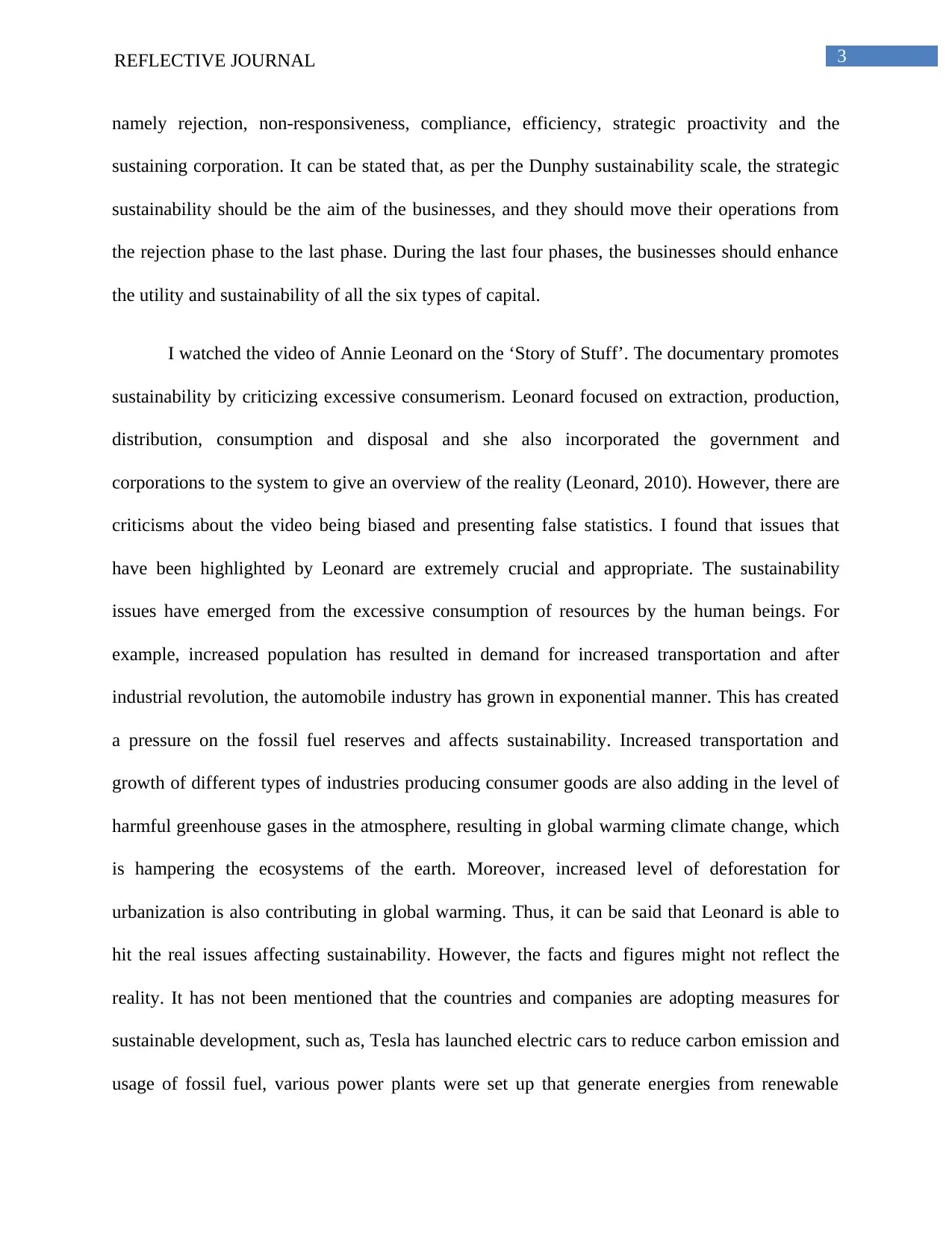
3REFLECTIVE JOURNAL
namely rejection, non-responsiveness, compliance, efficiency, strategic proactivity and the
sustaining corporation. It can be stated that, as per the Dunphy sustainability scale, the strategic
sustainability should be the aim of the businesses, and they should move their operations from
the rejection phase to the last phase. During the last four phases, the businesses should enhance
the utility and sustainability of all the six types of capital.
I watched the video of Annie Leonard on the ‘Story of Stuff’. The documentary promotes
sustainability by criticizing excessive consumerism. Leonard focused on extraction, production,
distribution, consumption and disposal and she also incorporated the government and
corporations to the system to give an overview of the reality (Leonard, 2010). However, there are
criticisms about the video being biased and presenting false statistics. I found that issues that
have been highlighted by Leonard are extremely crucial and appropriate. The sustainability
issues have emerged from the excessive consumption of resources by the human beings. For
example, increased population has resulted in demand for increased transportation and after
industrial revolution, the automobile industry has grown in exponential manner. This has created
a pressure on the fossil fuel reserves and affects sustainability. Increased transportation and
growth of different types of industries producing consumer goods are also adding in the level of
harmful greenhouse gases in the atmosphere, resulting in global warming climate change, which
is hampering the ecosystems of the earth. Moreover, increased level of deforestation for
urbanization is also contributing in global warming. Thus, it can be said that Leonard is able to
hit the real issues affecting sustainability. However, the facts and figures might not reflect the
reality. It has not been mentioned that the countries and companies are adopting measures for
sustainable development, such as, Tesla has launched electric cars to reduce carbon emission and
usage of fossil fuel, various power plants were set up that generate energies from renewable
namely rejection, non-responsiveness, compliance, efficiency, strategic proactivity and the
sustaining corporation. It can be stated that, as per the Dunphy sustainability scale, the strategic
sustainability should be the aim of the businesses, and they should move their operations from
the rejection phase to the last phase. During the last four phases, the businesses should enhance
the utility and sustainability of all the six types of capital.
I watched the video of Annie Leonard on the ‘Story of Stuff’. The documentary promotes
sustainability by criticizing excessive consumerism. Leonard focused on extraction, production,
distribution, consumption and disposal and she also incorporated the government and
corporations to the system to give an overview of the reality (Leonard, 2010). However, there are
criticisms about the video being biased and presenting false statistics. I found that issues that
have been highlighted by Leonard are extremely crucial and appropriate. The sustainability
issues have emerged from the excessive consumption of resources by the human beings. For
example, increased population has resulted in demand for increased transportation and after
industrial revolution, the automobile industry has grown in exponential manner. This has created
a pressure on the fossil fuel reserves and affects sustainability. Increased transportation and
growth of different types of industries producing consumer goods are also adding in the level of
harmful greenhouse gases in the atmosphere, resulting in global warming climate change, which
is hampering the ecosystems of the earth. Moreover, increased level of deforestation for
urbanization is also contributing in global warming. Thus, it can be said that Leonard is able to
hit the real issues affecting sustainability. However, the facts and figures might not reflect the
reality. It has not been mentioned that the countries and companies are adopting measures for
sustainable development, such as, Tesla has launched electric cars to reduce carbon emission and
usage of fossil fuel, various power plants were set up that generate energies from renewable
Paraphrase This Document
Need a fresh take? Get an instant paraphrase of this document with our AI Paraphraser
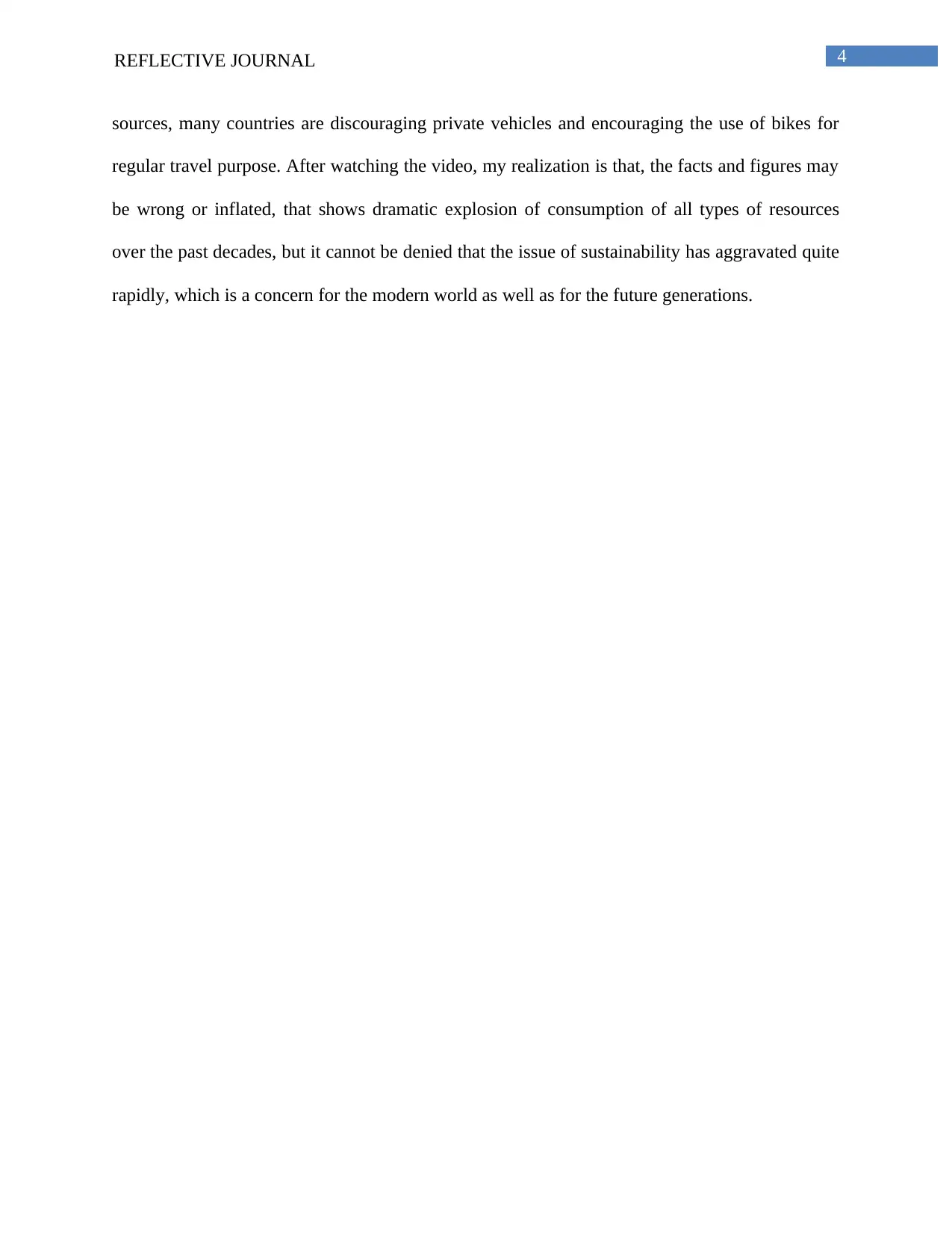
4REFLECTIVE JOURNAL
sources, many countries are discouraging private vehicles and encouraging the use of bikes for
regular travel purpose. After watching the video, my realization is that, the facts and figures may
be wrong or inflated, that shows dramatic explosion of consumption of all types of resources
over the past decades, but it cannot be denied that the issue of sustainability has aggravated quite
rapidly, which is a concern for the modern world as well as for the future generations.
sources, many countries are discouraging private vehicles and encouraging the use of bikes for
regular travel purpose. After watching the video, my realization is that, the facts and figures may
be wrong or inflated, that shows dramatic explosion of consumption of all types of resources
over the past decades, but it cannot be denied that the issue of sustainability has aggravated quite
rapidly, which is a concern for the modern world as well as for the future generations.
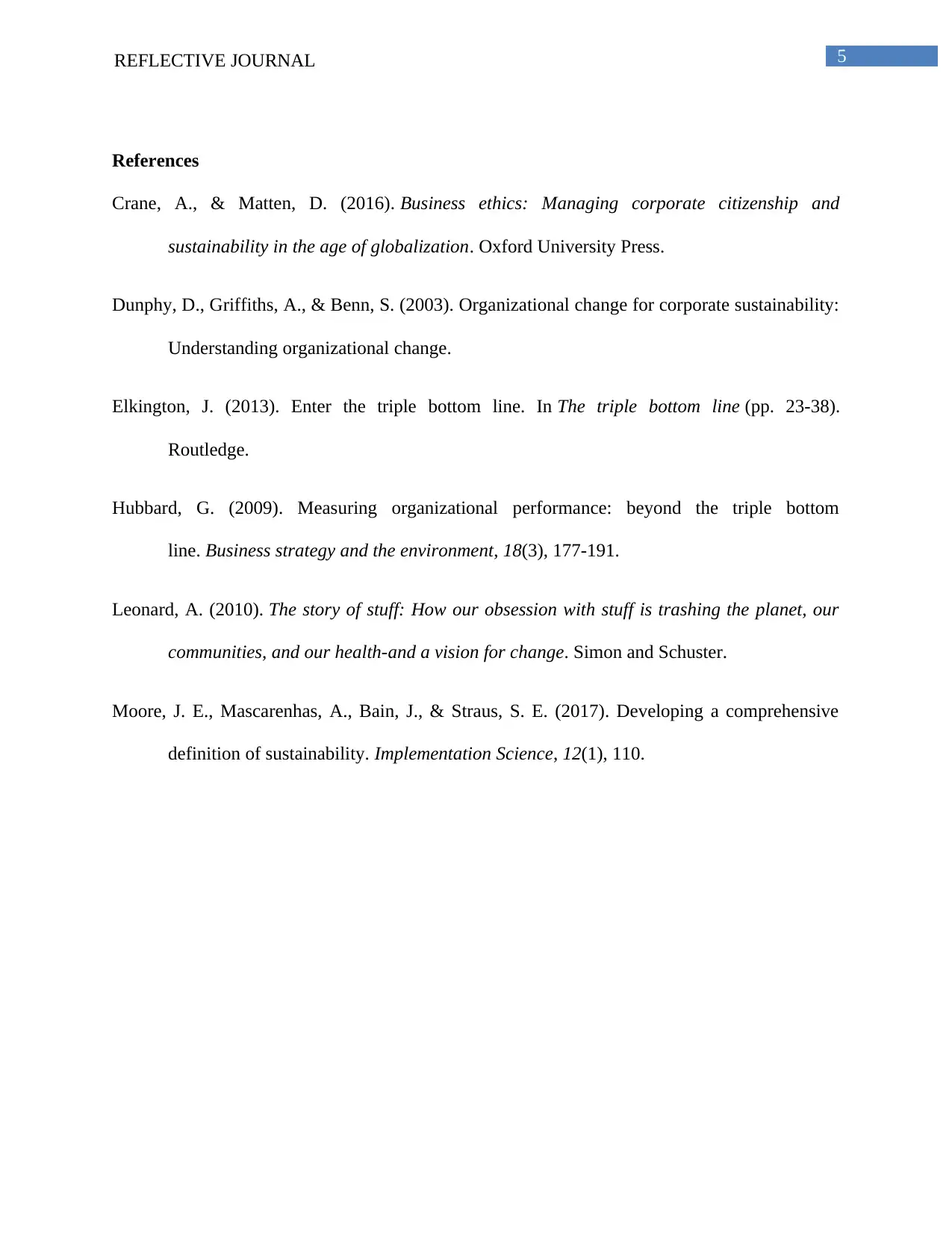
5REFLECTIVE JOURNAL
References
Crane, A., & Matten, D. (2016). Business ethics: Managing corporate citizenship and
sustainability in the age of globalization. Oxford University Press.
Dunphy, D., Griffiths, A., & Benn, S. (2003). Organizational change for corporate sustainability:
Understanding organizational change.
Elkington, J. (2013). Enter the triple bottom line. In The triple bottom line (pp. 23-38).
Routledge.
Hubbard, G. (2009). Measuring organizational performance: beyond the triple bottom
line. Business strategy and the environment, 18(3), 177-191.
Leonard, A. (2010). The story of stuff: How our obsession with stuff is trashing the planet, our
communities, and our health-and a vision for change. Simon and Schuster.
Moore, J. E., Mascarenhas, A., Bain, J., & Straus, S. E. (2017). Developing a comprehensive
definition of sustainability. Implementation Science, 12(1), 110.
References
Crane, A., & Matten, D. (2016). Business ethics: Managing corporate citizenship and
sustainability in the age of globalization. Oxford University Press.
Dunphy, D., Griffiths, A., & Benn, S. (2003). Organizational change for corporate sustainability:
Understanding organizational change.
Elkington, J. (2013). Enter the triple bottom line. In The triple bottom line (pp. 23-38).
Routledge.
Hubbard, G. (2009). Measuring organizational performance: beyond the triple bottom
line. Business strategy and the environment, 18(3), 177-191.
Leonard, A. (2010). The story of stuff: How our obsession with stuff is trashing the planet, our
communities, and our health-and a vision for change. Simon and Schuster.
Moore, J. E., Mascarenhas, A., Bain, J., & Straus, S. E. (2017). Developing a comprehensive
definition of sustainability. Implementation Science, 12(1), 110.
⊘ This is a preview!⊘
Do you want full access?
Subscribe today to unlock all pages.

Trusted by 1+ million students worldwide
1 out of 6
Related Documents
Your All-in-One AI-Powered Toolkit for Academic Success.
+13062052269
info@desklib.com
Available 24*7 on WhatsApp / Email
![[object Object]](/_next/static/media/star-bottom.7253800d.svg)
Unlock your academic potential
Copyright © 2020–2026 A2Z Services. All Rights Reserved. Developed and managed by ZUCOL.





